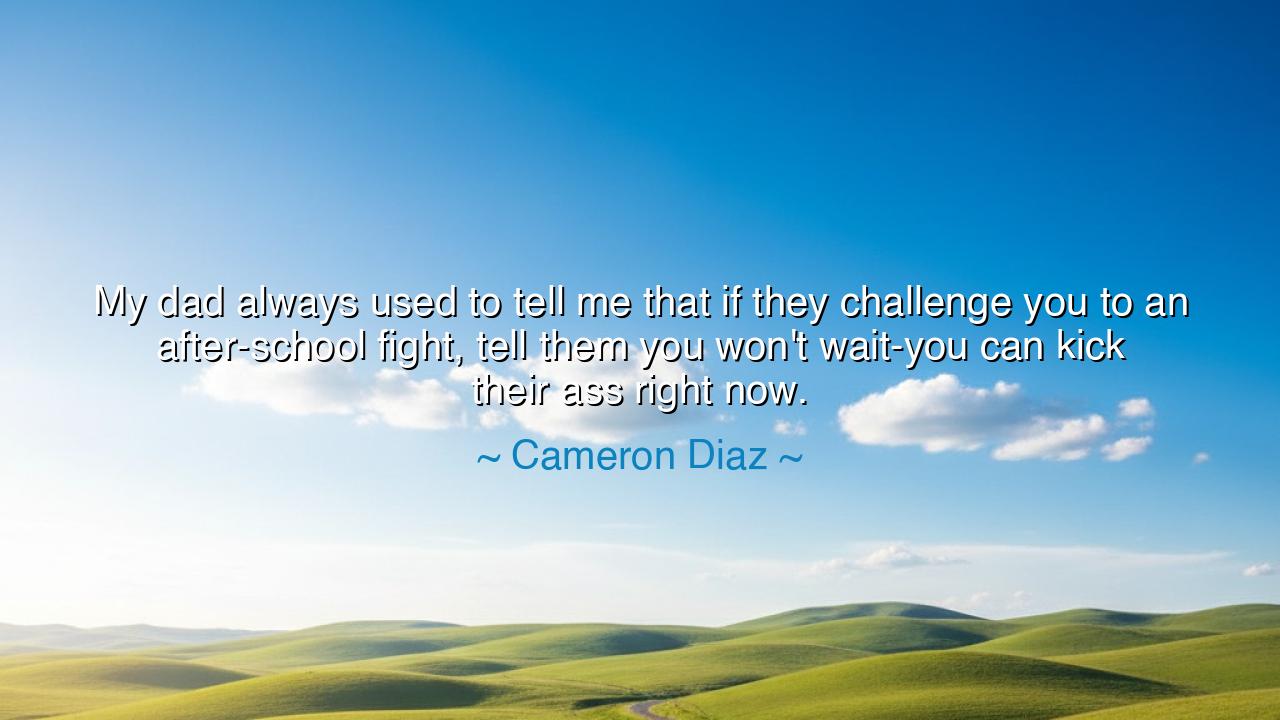
My dad always used to tell me that if they challenge you to an
My dad always used to tell me that if they challenge you to an after-school fight, tell them you won't wait-you can kick their ass right now.






Hearken to this fierce, curious counsel from a daughter to the ages: “My dad always used to tell me that if they challenge you to an after-school fight, tell them you won’t wait — you can kick their ass right now.” Spoken with blunt humor by Cameron Diaz, the line rings like a proverb of the street — raw, arresting, and charged with paternal theatre. Yet beneath the thunder of its language there dwells an older wisdom: the father’s voice is urging decisiveness, presence of mind, and the courage to meet threat with readiness rather than trembling deferment. In the cadence of that jest lies a lesson about the spirit that will not be postponed.
To read the line as mere license to violence is to miss the ember at its heart. In the world of the ancients, a father’s saying often served as shorthand for character-training: learn to stand erect before danger, refuse to let fear schedule your courage for some distant hour. Challenge, in this sense, is not only a call to fists but a call to posture — moral, social, psychological. The father teaches the child to answer the hour that arrives, to claim agency in the present, and to refuse the slow erosion of self that comes from saying “later” while the world presses. Thus the sentence becomes a parable of readiness more than a manual of harm.
Look to story and history for the same pulse. Think of Cincinnatus, the ploughman of Rome, who was called from his fields to take up command at once and save the republic — he did not wait for perfect preparation, but met fate with swift resolve. Think also of Muhammad Ali, who once said, “I’m so mean, I make medicine sick,” yet underneath the braggadocio was the iron will to step into the ring when the moment demanded and to stand unbowed for principle outside it. These are not tales that praise violence; they praise the swiftness of the upright — men who do not postpone the moral act, the defense of the weak, the effort that must be given now.
And yet the ancients would also warn: courage without wisdom becomes foolhardiness. A warrior trains to limit harm and to bring conflict to a swift close; a statesman seeks to avoid war until it is the only remedy. So, from this modern father’s quip we must draw twofold instruction: be ready — and be wise. When the world presses you, do not let timidity fossilize you. But when you respond, let your response be measured, guided by justice, and mindful of consequences. The true soul of the proverb is not the brawl but the refusal to be cowed into silence and the resolve to act for the right reason.
A real-life moment that illuminates both edges of this blade is the story of Rosa Parks. She would not be moved that evening on the bus — she refused, swiftly and decisively, and her single act became pivotal. She did not seek confrontation for its own sake; she met an injustice in the present and acted without delay. Her courage did not demean or escalate into needless violence; instead it catalyzed a movement because it combined immediate refusal with moral clarity. This is the shape of the father’s advice at its best: immediate courage married to righteous purpose.
What practical steps, then, shall you take if you carry this proverb in your breast? First, cultivate presence and calm: practice breathing, situational awareness, and clear speech so that you can decide in an instant without panic. Second, learn de-escalation and boundary-setting: use words that end conflict before fists begin; name the offense and demand respect. Third, prepare physically and legally — healthy bodies, self-defense skills taught to restrain and escape (not to injure), and knowledge of when to seek help from elders or authorities. Fourth, anchor your readiness in moral purpose: ask whether the action protects dignity and life, or merely feeds ego.
So let this saying be your smithy: the father’s thunderous jest become a bell that calls you to uprightness, not to wanton harm. Boldness is a tool; use it to defend the weak, to refuse humiliation, to claim your rightful place in the world — but temper it with prudence, compassion, and law. In the school of life, do not promise tomorrow the courage you can give today; yet never confuse courage with cruelty. Remember, the great ones of old did not swagger into war; they girded themselves for necessity and acted to restore justice. Let that be the meaning you carry forward.






AAdministratorAdministrator
Welcome, honored guests. Please leave a comment, we will respond soon